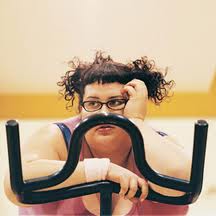Is Cardio Making You Fat?
 There are many schools of thought when it comes to the best type of exercise to shed pounds. At one time, cardio was the exercise of choice to lose weight, now some are touting the belief that cardio actually adds pounds. Is cardio making you fat? There are some good reasons that cardio may not be the best route to take if you’re trying to lose weight. There are also ways to use cardio and maximize its fat burning capabilities.
There are many schools of thought when it comes to the best type of exercise to shed pounds. At one time, cardio was the exercise of choice to lose weight, now some are touting the belief that cardio actually adds pounds. Is cardio making you fat? There are some good reasons that cardio may not be the best route to take if you’re trying to lose weight. There are also ways to use cardio and maximize its fat burning capabilities.
As with all types of exercise, the more you do it, the more efficient your body becomes.
Efficiency is a good thing at work, but not when you’re trying to shed fat and burn calories. In fact, it can cause you to burn fewer calories. If you’re using one type of aerobic exercise for your fitness workout, such as running, bike riding or rowing, and doing the same thing each day, you’re body becomes efficient. What burned hundreds of calories initially, now burns far less. You’ll be working longer to get the most benefits because your body adapts.
Your body produces a stress reaction when you put on your running shoes.
While the timing of that stress reaction may not be exactly when you put on your running shoes, but rather based on when you run or do your cardio, it does occur. In fact, some trainers recommend you vary your running time to avoid it. The stress reaction spews out cortisol, which increases your insulin levels. That increase not only makes you crave sugar, insulin is the fat storage hormone that packs that fight on your body.
Aerobic exercise doesn’t differentiate in the type of fuel it uses.
Your body has options when it comes to converting materials into usable fuel. It can choose to burn your fat or burn your muscle mass. When you do aerobic exercise, it could be either one. However, with strength training, it’s building the muscles so it tends to use fat. Strength training burns more fat while also building muscle mass and is the preferred method to aerobic exercises. When you burn muscle mass, it can interfere with the weight loss process and even make you gain weight because muscle tissue requires more calories to maintain than fat tissue does.
- Studies show that after a run, most people eat 100 calories more than they burn.
- The speed of your cardio makes a difference. You need to make it super fast or slow, the middle of the road actually puts on weight. Walking on an incline is one way to take it slow.
- Some strength training can also double as cardio. Think kettlebells or other types of exercise that provide multiple benefits.
- Including cardio, strength, balance and flexibility training in your workout is important for total fitness. While doing cardio exclusively may affect your weight loss goals, combining it with other strength training provides an afterburn that keeps your furnace burning extra calories after the workout ends.



 It’s a known fact that grains are the hardest to digest. After all, they’re nothing more than seeds. Seeds are meant to be tough and durable. Seeds are often scattered by birds or animals in their excrement after they eat the fruit of the plant. If they can go through the digestive system of animals without being harmed or digested, why would you think your digestive system is any different? Of course, we grind and mill the grains until it’s flour, so that should make them easier to digest, right? The answer is no. There are other reasons that grains are hard to digest.
It’s a known fact that grains are the hardest to digest. After all, they’re nothing more than seeds. Seeds are meant to be tough and durable. Seeds are often scattered by birds or animals in their excrement after they eat the fruit of the plant. If they can go through the digestive system of animals without being harmed or digested, why would you think your digestive system is any different? Of course, we grind and mill the grains until it’s flour, so that should make them easier to digest, right? The answer is no. There are other reasons that grains are hard to digest.
 Many people who want to lose weight, don’t want to lose muscle mass, or at least they shouldn’t want to lose it. That’s because the more muscle tissue you have, the easier it is to lose weight. Don’t worry, you can build muscle and lose fat while doing it. You can also shed those unwanted pounds at the same time and create a body environment that will keep off weight permanently.
Many people who want to lose weight, don’t want to lose muscle mass, or at least they shouldn’t want to lose it. That’s because the more muscle tissue you have, the easier it is to lose weight. Don’t worry, you can build muscle and lose fat while doing it. You can also shed those unwanted pounds at the same time and create a body environment that will keep off weight permanently.












